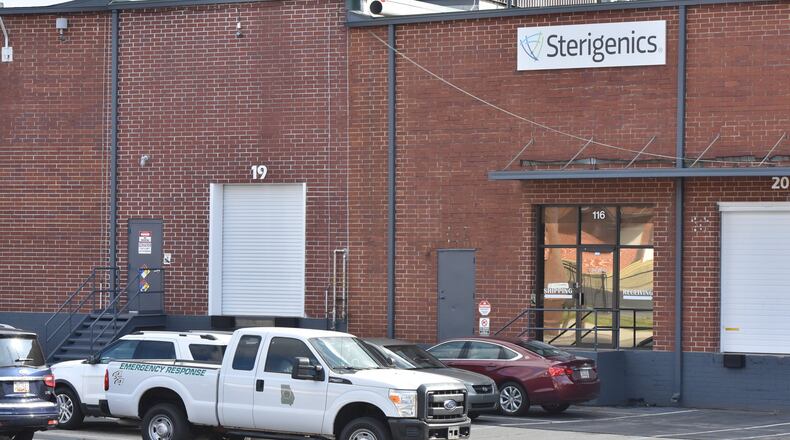Cobb County has officially deemed Sterigenics a high hazard industrial facility, triggering a slew of stricter fire safety regulations that could pose a major hurdle to the company resuming operations at its facility near Smyrna.
Sterigenics uses the highly combustible and carcinogenic gas ethylene oxide to sterilize single-use medical devices, and has been classified as a “storage” facility for decades.
But the county reconsidered the company’s designation after Sterigenics entered into an agreement last month with the state that requires it to install additional emission controls. Sterigenics suspended operations to complete those upgrades.
“The county is going to keep them closed until we’re certain they’ve met all the county code requirements and the fire marshal requirements,” said Cobb Commissioner Bob Ott, who represents the area around the plant.
Ott added that the fire marshal plans to hire an outside consultant to help the county determine what fire protection measures are required for the facility.
It is unclear how long it will take for the company to come into compliance with the new standards, which include heavier fire safety regulation on things like wall thickness and storage of hazardous material, or how much those upgrades will cost.
A Sterigenics spokesman declined to comment for this article.
Stop Sterigenics Georgia, a citizen group that has advocated for the governor to close the plant, applauded the county’s decision.
“We believe that it will be difficult for Sterigenics to modify the building to fully comply with the high hazard classification,” said Janet Rau, the group’s president. “We think this move by the county does actually have the potential to keep them shut down.”
Residents who live close to the plant were relieved that the county is taking a more proactive role in regulating the facility, which can hold up to 16,000 pounds of ethylene oxide. The plant has been at the center of public concern since July, when elevated cancer risk associated with ethylene oxide was first publicized.
But some residents questioned whether county officials dropped the ball by not changing the designation earlier.
“Any time there’s a business that is manufacturing, especially using chemicals, I would think that the county would want to stay current in terms of their operations to make sure that all proper and appropriate safety measures are being followed,” said Rhen Cain, who lives less than a quarter of a mile from the plant.
County Spokesman Ross Cavitt said the building had been classified as storage for many years, and prior permit applications for renovation did not warrant a comprehensive review of its occupancy status. The land on which the facility sits is zoned industrial.
Cobb’s legal department was preparing Friday to issue a letter to Sterigenics barring the company from doing any additional construction until the county approves new permits based on the high hazard industrial status, Cavitt said.
Kevin Chambers, a spokesman for the state Environmental Protection Division, which began conducting air monitoring around Sterigenics this week, said building code and fire safety were county matters. He said the agency had conducted a review of the relevant laws and did not find any requirement for the EPD to conduct an environmental assessment or take any other action based on the fire marshal’s classification.
An outside consultant, being paid by the county, Smyrna and the city of Atlanta, also collected air samples this month.
The story so far:
July: WebMD and Georgia Health News publish the first story about possible elevated cancer risks around medical sterilization facilities based on a report from the federal Environmental Protection Agency.
August: Sterigenics enters into an agreement with the state to install new emission controls. A few weeks later, Georgia opens an emergency investigation into the company over a gas leak and evacuation at the plant in July.
September: State Senator Jen Jordan files a legal challenge to the agreement between Sterigenics and the state. Air monitoring begins around the plant, by both the state and a private contractor hired by Atlanta, Smyrna and Cobb.
About the Author
Keep Reading
The Latest
Featured




